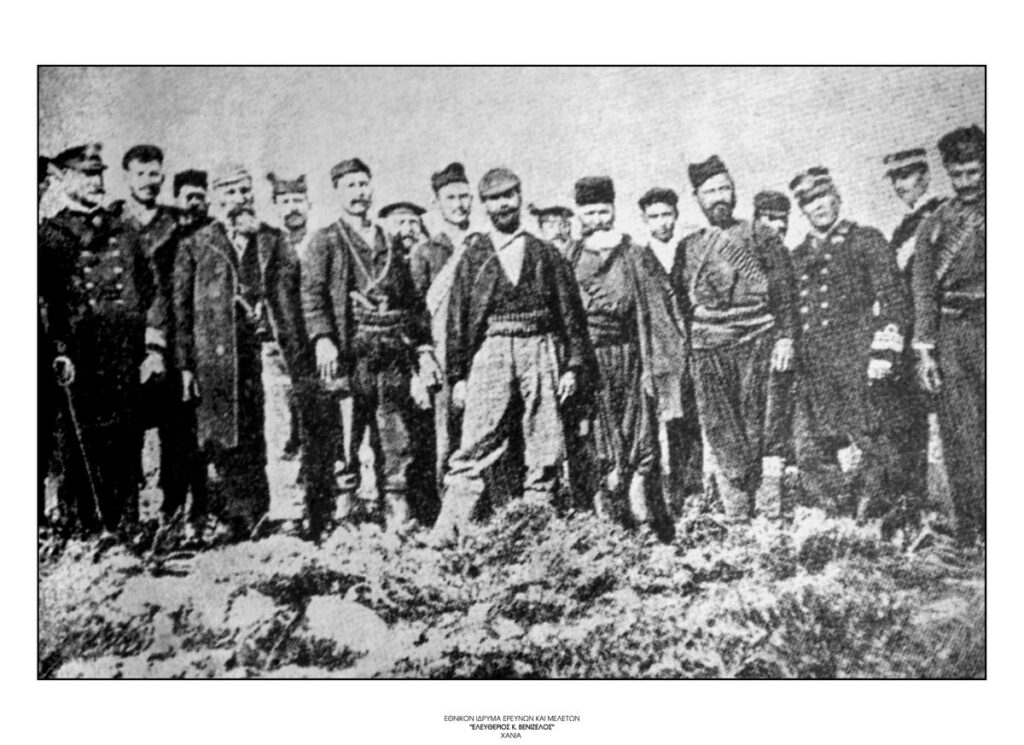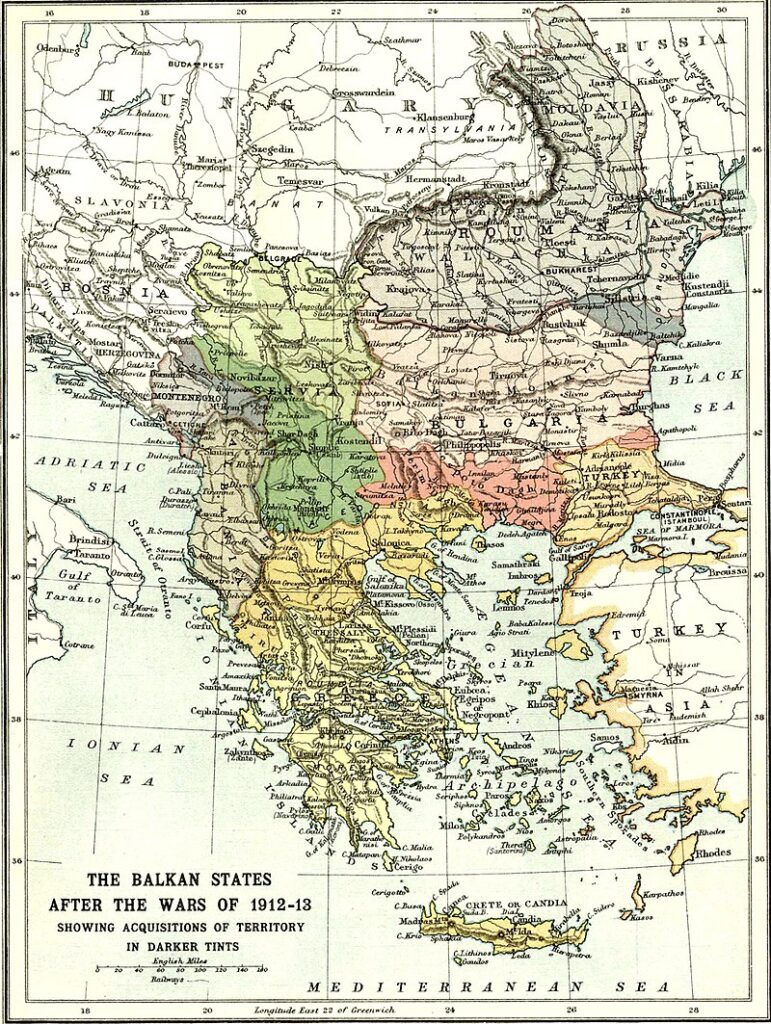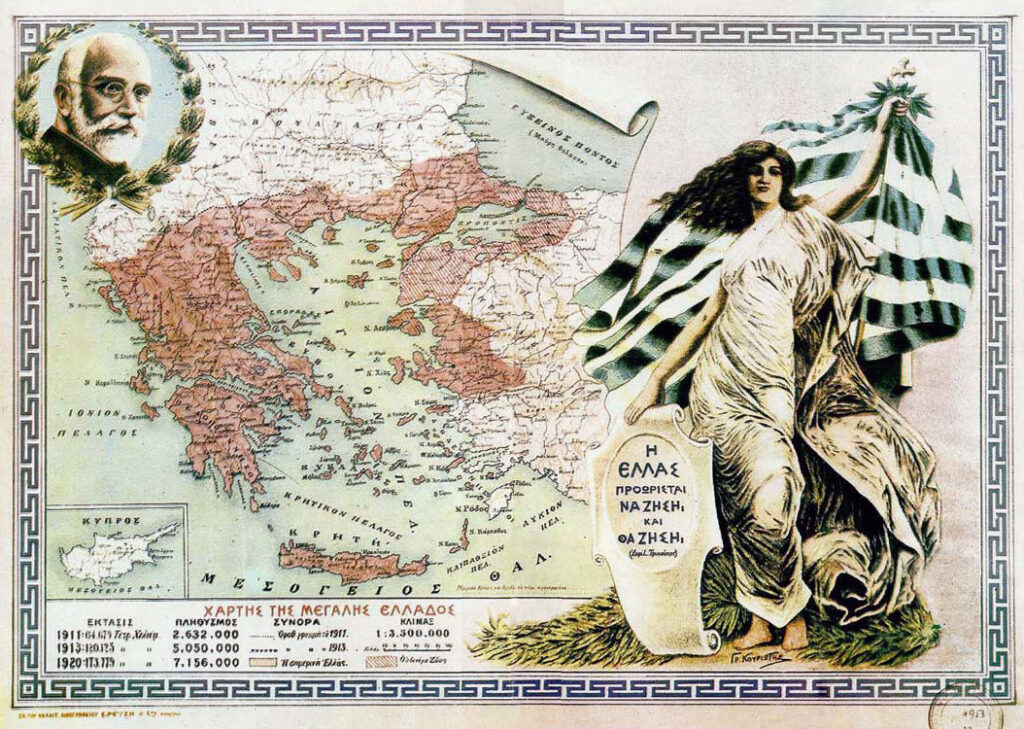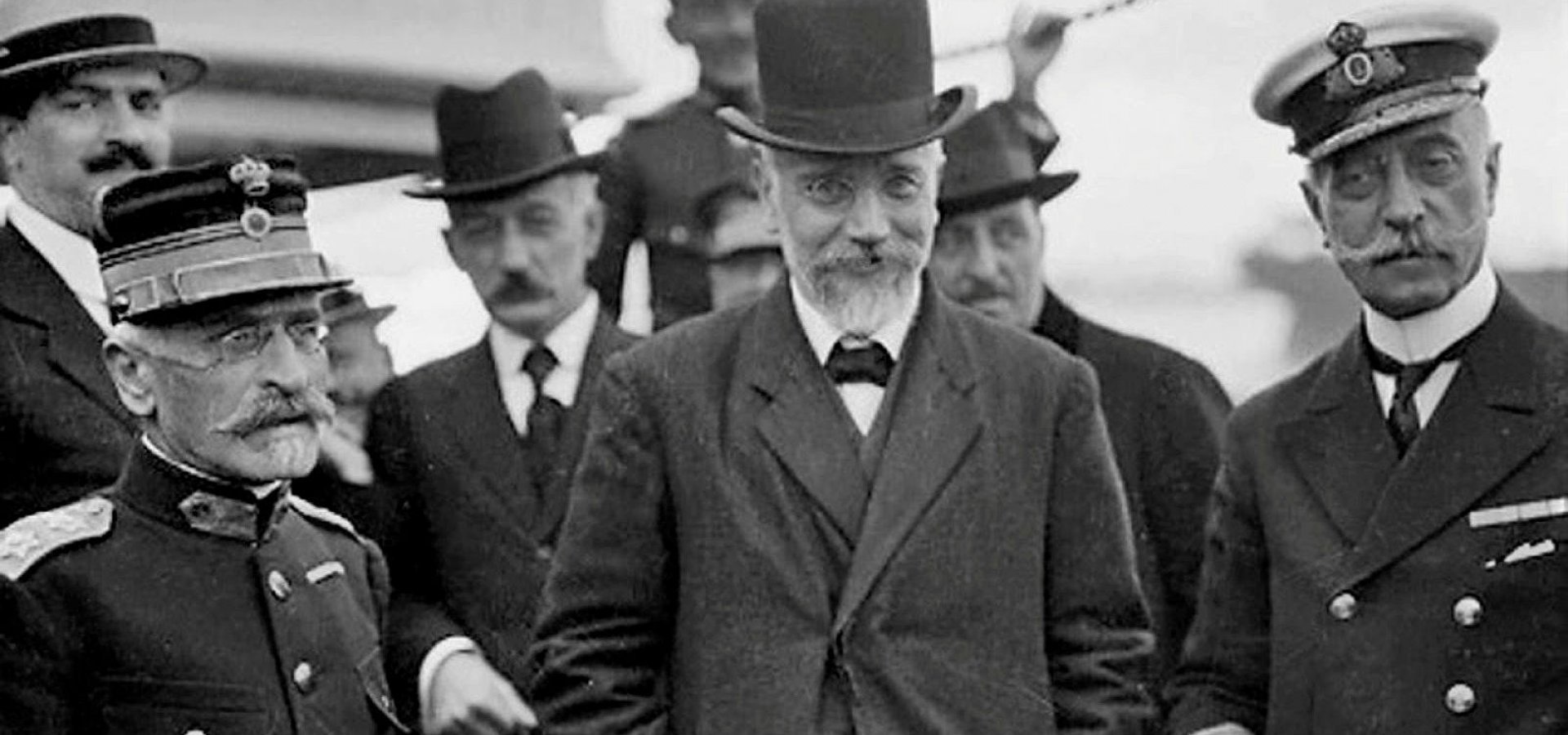By Timoleon Palaiologos,
The name Eleftherios Venizelos is definitely a name every Greek person is familiar with. To put it into perspective, Venizelos is what George Washington is to the U.S.A., Otto Von Bismarck to Germany, and Victor Emmanuel II to Italy. His name is connected to the greatest territorial expansion of the modern Greek state and the liberation of millions of Greek people. However, his political maneuvers were not always successful and, sometimes, the backlash sparked furious oppositions, resulting in immense turmoil in the Greek society. Venizelos was born on August 23rd, 1864, in the village of Mournies in Crete, which was still under Ottoman rule. He was the son of merchant Kyriakos Venizelos and Styliani Ploumidaki. His father participated in the Cretan revolt of 1866-1869 and, as a result, his family fled to the island of Syros in Greece to avoid prosecution. He finished secondary education in Syros in 1880, and the following year enrolled at the University of Athens as a law student. When he finished Law School, he returned to Crete in 1886 and practiced law in the city of Chania.
In 1897, the Cretan people revolted once again against the Ottoman empire and unilaterally declare the union of Crete with Greece. After a failed Greek expeditionary force arrives from Greece, and the war of 1897 between Greece and Turkey, the Great Powers of Europe (the British Empire, the Russian Empire, Germany, and Austria-Hungary) formally occupy the island and force the resolution of the crisis through the total autonomy of Crete from Ottoman rule. The Executive Body of the Cretans consisted of several important political figures, among which Venizelos himself. In the autonomous Cretan State that was established as an aftermath of the revolt, Venizelos played a major role in the reform of the judicial system of the Cretan State.

Revolt in Theriso
In 1901, Venizelos resigned from his post in the Cretan State, opposing the authoritarian rule of the High Commissioner of the Island, Prince George of Greece. Some years later, on March 1905, Venizelos would lead a revolt against the Cretan government and the High Commissioner that began in the village of Theriso in Crete. The Great Powers tried to intimidate the revolutionaries with an ultimatum that was rejected by the Cretans and declared martial law. However, as the revolutionaries did not seem to back down, the Great Powers began negotiating with Venizelos and, as a result, Venizelos managed to get the High Commissioner to resign and ensured that the constitution would be amended. The Cretan Assembly validated the constitutional amendments and elected a five-member executive committee, where Venizelos was Appointed Foreign Minister and Minister of Justice. In the following elections of 1910, he was elected Prime Minister of the Cretan State.
Following an invitation from the Military League that had revolted in Goudi, Athens, against the Greek government, Venizelos visited Athens and participated in the Greek elections of August 1910 as an independent politician and became Prime Minister. Wanting an absolute majority in the Greek Parliament, Venizelos swiftly called for new elections that were set for November of 1910. The old political parties of the Greek Parliament (the ones that ruled before the Goudi military revolt) objected to this situation by sabotaging the new elections and not participating. As a result of the absence of the old parties, the Liberal Party of Venizelos managed to win 307 out of the 362 parliament seats, winning the absolute majority. The cabinet of Venizelos proposed important revisions to the Greek constitution, and there were major reformations in the Greek Army.
First and Second Balkan Wars
After the important reformation of the Greek Army and Navy and the reappointment of Crown Prince Constantine as Field Marshal of the Army, Venizelos came the alliance with Bulgaria and Serbia against the Ottoman Empire, known as the Balkan League. The combined forces of the Balkan allies entered a war against the Ottomans in October 1912. Venizelos’s presence as the Prime Minister played a major role in the outcome of the war for Greece. Venizelos personally ordered the Field Marshal of the Greek Army, Crown Prince Constantine, through a telegraph to head for the city of Thessaloniki instead of Monastiri (Bitola) that Constantine had proposed. This development resulted in the capture of Thessaloniki exclusively by the Greek Army, just a few hours before the Bulgarian Army reached the city, leading to the full annexation of the city by Greece.

During the peace talks and the Treaty of London that was signed in April 1913, Venizelos showed excellent diplomatic skills. Realizing the revisionist Bulgarian position regarding the territorial gains of the First Balkan War, Venizelos signed a secret mutual defense agreement with Serbia (May 19th, 1913) against a Bulgarian attack. That just shows how Venizelos completely understood the geopolitical and diplomatic escalations, as just a few weeks after the signing of the Treaty of London, Bulgaria, with no warning whatsoever, attacked its former allies, Greece and Serbia.
During the Second Balkan War, Venizelos completely understood the realistic situation and sought an armistice with the Bulgarian government after the Greek victory in the battle of Kresna. In the peace talks and in the Treaty of Bucharest (1913), he managed to ensure sovereignty over most of the territories that were captured by the Greek Army, with the only exemption being the territory of modern-day Southern Albania, where a significant number of Greeks resided. But even so, Venizelos led diplomatic efforts and achieved the signing of the Protocol of Corfu (1914) with the Albanian government that recognized the existence of a Greek minority and granted them significant autonomy.
The National Schism
Just a year after the end of the Second Balkan War, Archduke Franz Ferdinand is assassinated and Austria-Hungary attacks Serbia. The Greek political scene is divided into two, the Venizelists and the Monarchists. The Venizelists were fervent supporters of Greece joining the Entente, not only because they believed in the superiority of the Entente allies, but because the geological reality of Greece (that is itself a peninsula and consists of thousands of islands), which strongly led to the conclusion that the only viable situation would be to join the allies. The Monarchists, on the other hand, kept a germanophile stance on the matter, not only because Constantine — that became King after his father’s assassination — had married the sister of the German Kaiser, Sophie, but they too believed in the German military superiority. However, as the Monarchists also knew, the Greek geological reality could not allow them to join the Central Powers, so they supported neutrality.
This divided political situation led to the resignation of Venizelos in February 1915 and the re-election of Venizelos in the elections of May 1915. When King Constantine rejected Venizelos’s request for a partial draft and Venizelos contributed to Allied troops disembarking in Thessaloniki, the King had the Prime Minister replaced, a move that could not be constitutionally justified. After this escalation, the Liberal Party of Venizelos boycotted the new elections and, on the 26th of September, 1916, they proclaimed the National Defense government in Thessaloniki, practically dividing the country into two. In the summer of 1917, the Entente forced King Constantine to abdicate the throne, living his son Alexander as King and effectively reuniting Greece that officially declared war on the Central Powers.

When the war ended, Greece was granted a seat in the Paris Peace Conference (1919-1920) under Prime Minister Venizelos. Venizelos managed to almost achieve the “Megali Idea” of the Greek nation, a form of national completion through the integration of all the lands with the Greek population. The Greek Army landed in Smyrna on May 15th, 1919, in order to preserve order in the region and the signing of the Treaty of Sèvres (1920), ratified the occupation with the provision of permanent annexation after a referendum. Venizelos managed to complete the so-called “Greece of two continents and five seas”. Having effectively completed the national dream of Greece, Venizelos proclaimed elections for November 1920. Even though Venizelos won the majority of the votes (50.31%), the electoral system of the time resulted in an unprecedented electoral catastrophe for the Liberal Party, which managed to receive only 110 out of the 370 seats in the Greek Parliament. In a sense, this electoral defeat of Venizelos may have resulted in the defeat of the Greek Army in the Asia Minor Campaign and the expulsion of more than 1.5 million Greeks from Thrace, Asia Minor, and Pontus.
Later in his political career, Venizelos would get re-elected as Prime Minister during the Crash of 1929 and would carry the burden of the dire financial situation that Greece would see itself get involved with. He would participate in an unsuccessful coup in 1935 and would leave his last breath in Paris on March 18th, 1936. Venizelos began his political career in Greece as the liberator, after his clash with the King he would be seen by some as an “agent of the British” and, even now, the views on this political figure are divided and can still cause major political discussion. One thing is for certain, though: Venizelos may be long gone, but his legacy will always be remembered.
References
- Eleuthérios Venizélos, britannica.com, Available here
- Biography of Eleftherios Venizelos, venizelos-foundation.gr, Available here
- Ελευθέριος Βενιζέλος, sansimera.gr, Available here
- Αύγουστος-Σεπτέμβριος 1916: Το κίνημα της «Εθνικής Άμυνας» και ο Εθνικός Διχασμός, defencenet.gr, Available here
- Θανάσης Διαμαντόπουλος, «10 και μία δεκαετίες πολιτικών διαιρέσεων: Οι διαιρετικές τομές στην Ελλάδα την περίοδο 1910-2017», 1ο τεύχος, 1η έκδοση, Εκδόσεις «ΕΠΙΚΕΝΤΡΟ», Θεσσαλονίκη, 2017




